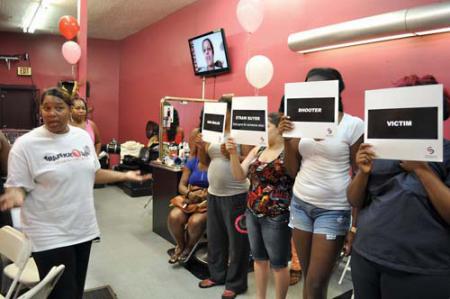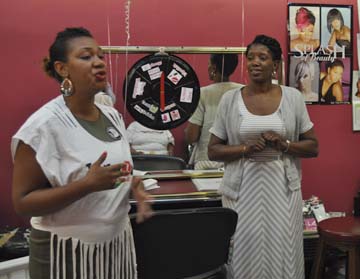July 24, 2013
 Operation Lipstick: Kim Odom gave a presentation on the role that straw purchases play in the illicit gun trade at Princey's hair salon in Codman Square. Photo by Bill Forry
Operation Lipstick: Kim Odom gave a presentation on the role that straw purchases play in the illicit gun trade at Princey's hair salon in Codman Square. Photo by Bill Forry
“Today, we’re going to talk about straw buyers,” explained Nancy Robinson, executive director of Citizens for Safety, a national group that has made “Where Did the Gun Come From?” its clarion call as it seeks to combat violence in the city. “Because when we think about who the straw buyers are, often he’s a she. Just like we’re easy prey for drug dealers and sex traffickers, all too often it’s a woman who’s being exploited.”
On Monday, Robinson joined a cadre of veteran anti-violence activists— most of them moms who’ve lost sons violently on Boston streets— to roll out what they’re calling operation LIPSTICK (The acronym stands for Ladies Involved in Putting a Stop to Inner-City Killing.) The concept is to bring the facts about gun trafficking right to the female’s sanctum sanctorum: the hair salon.
The choice of audience is quite deliberate. Whether they’re love-struck pawns or straight-up thugs themselves, the “iron pipeline” of intra-state gun runners would be a weak stream without the “straw chicks” who make purchases that their felonious boyfriends cannot.
In 2011, the Reporter documented just such a case in a special report done in conjunction with Northeastern University’s Watchdog New England. The story detailed how two Georgia men with long criminal histories conspired with two women with “clean” records to accumulate an arsenal of 18 Taurus handguns in Atlanta. Over a two-month period in 2009, the group bought up an assortment of weaponry at dealers and gun shows—where record-keeping is lax— all of which were then transported to Massachusetts and sold on the streets of Boston, according to an indictment brought by federal prosecutors.
Putting a tangible dent in gun violence nationally, Robinson and others argue, must include a multi-track approach that includes tougher gun laws at the federal level. But it also depends on discouraging criminal enterprises like the Atlanta cell — in part by spreading the word about the consequences that will eventually come back to bite straw purchasers.
Monday is typically a quiet day inside Princey’s hair salon — a tidy shop nestled into a busy block of storefronts across from Dorchester District Court in Codman Square. In fact, its usually a well-deserved day off for owner Donna Small and her band of beauticians.
But, this week was different. By 4 p.m., Princey’s was jammed tighter than a wedding-season Saturday — and that was before the expected after-work rush. By the end of the evening, more than 100 women had come through the doors and 88 of them signed a pledge to never buy, hide, or carry guns for anyone else.
The draw was the promise of a one-day only discount on perms, colorings, and nail treatments – with a grand prize of a free massage. Customers could spin a wheel-of-fortune contraption mounted on the shop’s huge mirror to win coupons and gift bags.
Kim Odom, whose 13-year-old son Steven was slain while walking home on his own street near Morton Village back in 2007, was one of the leaders of the salon discussion. She led a brief presentation that illustrated the chain of events that enables gun traffickers to assemble their arsenal. All too often, Odom noted, the chain starts with a woman who is coerced and cajoled or convinced to breathe life into conspiracy with multiple purchases.
Her presentation contrasted what happens in the aftermath of a gun homicide with the public reaction to a deadly outbreak of food poisoning.
“What happens when there’s a deadly case of salmonella in a community?” Odom asked. “Do people just focus on the victims? No, they want to know the source. They want to know where that food was contaminated. And the FDA goes to that factory.”
“This is what we have to start doing— and what the media needs to start doing— with guns,” she added.
Odom has long struggled with the question of where the gun that killed her son originated. Law enforcement officials have told her it came from Georgia, she says. But no one is certain how it got to Boston and into the hands of his alleged murderer, Charles Bunch, Jr., a Mattapan teen who was himself gunned down — allegedly with the same Colt .357 Python revolver that was used in Odom’s homicide— ten days later.
In 2009, Kim attended a “traffic jam” workshop organized by Citizens for Safety and had an epiphany as she watched a video about women’s role in the trafficking pipeline.
“That was a real awakening for me,” she says.
 Lipstick talk: Page Clark, left, speaks about the problem of straw purchases as Ruth Rollins looks on. Photo by Bill ForryAnother mom on hand for the Lipstick launch on Monday was Ruth Rollins, whose 21-year-old son Warren Danny Hairston was gunned down in 2007. A professional anti-domestic violence advocate, Rollins is an experienced organizer and is especially adept in counseling to vulnerable women – the kind who might get caught up in a straw conspiracy.
Lipstick talk: Page Clark, left, speaks about the problem of straw purchases as Ruth Rollins looks on. Photo by Bill ForryAnother mom on hand for the Lipstick launch on Monday was Ruth Rollins, whose 21-year-old son Warren Danny Hairston was gunned down in 2007. A professional anti-domestic violence advocate, Rollins is an experienced organizer and is especially adept in counseling to vulnerable women – the kind who might get caught up in a straw conspiracy.
Rollins says that the Lipstick effort grew out of smaller workshops held over the last year. She and others decided it was time to bring the message home to women in a more intimate setting. “It really comes down to meeting people where they are and trying to reach women specifically,” she said.
In most workshops, she says, a prosecutor from Suffolk County District Attorney Dan Conley’s office will also be on hand to drive home the message that this is a serious crime. “Assistant District Attorney Dan Mulhern is a regular at our workshops,” says Nancy Robinson. “He comes in and talks about the dire consequences, because what we’ve found is that the first time many women understand this is a crime is when the get the knock on the door [from the police]. He gives them that perspective.”
The Lipstick group will host two workshops to train new supporters in preparation for future outreach at other salons in Boston and around the state. On Aug. 1, the group will sponsor a workshop and dinner targeting the city’s faith community at St. Mary’s Church on Cushing Avenue in Dorchester. The event starts at 5:30 p.m. On Fri., Aug. 2, a second workshop focused on youth and street workers will be held at the Grove Hall Community Center, 51 Geneva Ave.
Anyone interested in attending either event is asked to RSVP by calling 617-233-5363.


